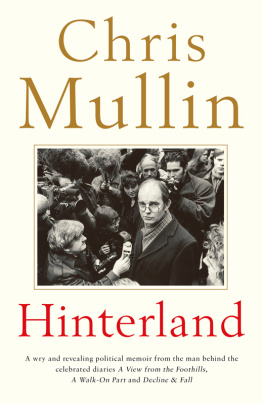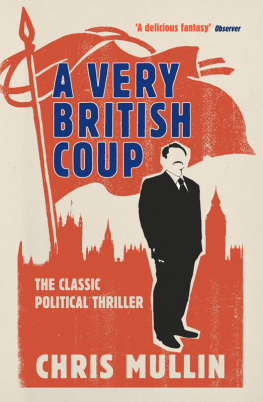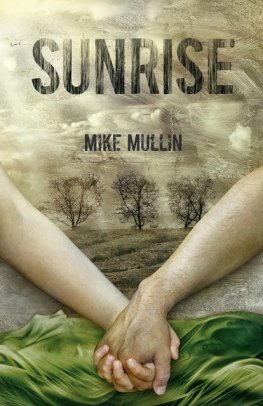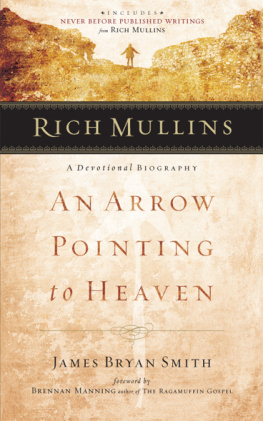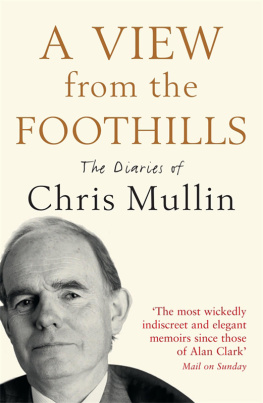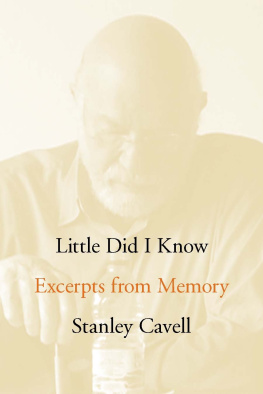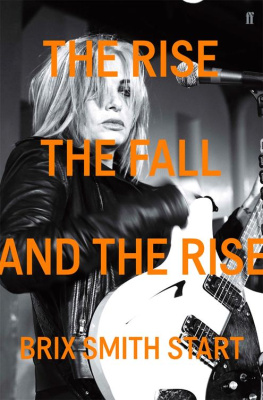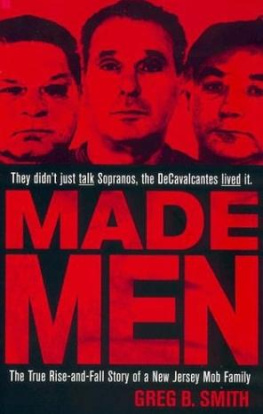Mullin - A Walk-On Part
Here you can read online Mullin - A Walk-On Part full text of the book (entire story) in english for free. Download pdf and epub, get meaning, cover and reviews about this ebook. year: 2011, publisher: Profile Books Ltd, genre: Detective and thriller. Description of the work, (preface) as well as reviews are available. Best literature library LitArk.com created for fans of good reading and offers a wide selection of genres:
Romance novel
Science fiction
Adventure
Detective
Science
History
Home and family
Prose
Art
Politics
Computer
Non-fiction
Religion
Business
Children
Humor
Choose a favorite category and find really read worthwhile books. Enjoy immersion in the world of imagination, feel the emotions of the characters or learn something new for yourself, make an fascinating discovery.

- Book:A Walk-On Part
- Author:
- Publisher:Profile Books Ltd
- Genre:
- Year:2011
- Rating:4 / 5
- Favourites:Add to favourites
- Your mark:
- 80
- 1
- 2
- 3
- 4
- 5
A Walk-On Part: summary, description and annotation
We offer to read an annotation, description, summary or preface (depends on what the author of the book "A Walk-On Part" wrote himself). If you haven't found the necessary information about the book — write in the comments, we will try to find it.
Mullin: author's other books
Who wrote A Walk-On Part? Find out the surname, the name of the author of the book and a list of all author's works by series.
A Walk-On Part — read online for free the complete book (whole text) full work
Below is the text of the book, divided by pages. System saving the place of the last page read, allows you to conveniently read the book "A Walk-On Part" online for free, without having to search again every time where you left off. Put a bookmark, and you can go to the page where you finished reading at any time.
Font size:
Interval:
Bookmark:
A WALK-ON PART
ALSO BY CHRIS MULLIN
Diaries
A View from the Foothills
Decline & Fall
Novels
A Very British Coup
The Last Man Out of Saigon
The Year of the Fire Monkey
Non-fiction
Error of Judgement: the truth about the Birmingham bombings
Diaries 19941999
edited by Ruth Winstone

First published in Great Britain in 2011 by
PROFILE BOOKS LTD
3a Exmouth House
Pine Street
London EC1R 0JH
www.profilebooks.com
Copyright Chris Mullin, 2011
1 3 5 7 9 10 8 6 4 2
Text design by Sue Lamble
Typeset in Stone Serif by MacGuru Ltd
info@macguru.org.uk
Printed and bound in Great Britain by
Clays, Bungay, Suffolk
The moral right of the author has been asserted.
All rights reserved. Without limiting the rights under copyright reserved above, no
part of this publication may be reproduced, stored or introduced into a retrieval
system, or transmitted, in any form or by any means (electronic, mechanical, photo
copying, recording or otherwise), without the prior written permission of both the
copyright owner and the publisher of this book.
A CIP catalogue record for this book is available from the British Library.
ISBN 978 1 84668 523 1
eISBN 978 1 84765 753 4
The paper this book is printed on is certified by the 1996 Forest Stewardship
Council A.C. (FSC). It is ancient-forest friendly. The printer holds FSC chain of
custody SGS-COC-2061

With love to Ngoc, Sarah and Emma;
in memory of Leslie and Teresa Mullin
and with gratitude to the people of Sunderland
This is my third and final volume of diaries. It covers the period from the day of John Smiths death in May 1994 to the moment of my assumption into government in July 1999. Although published out of sequence, the complete work embraces the rise and fall of New Labour from the moment of its inception to the moment that Gordon Brown walked out of Downing Street.
Looking back to those early years, long before the shadow of Iraq fell across the New Labour project, several thoughts occur to me. First, how much Tony Blair got right. He was surely right about the need to seize the middle ground and stay there. His decision to rewrite Clause IV of the Labour Party constitution implying as it did nationalisation of the means of production, distribution and exchange was in retrospect a master stroke, though it didnt feel that way at the time. His strategy of promising little and delivering more, in contrast to the over-promising and under-delivering of previous governments, was also surely vindicated. Likewise his determination to tackle the huge benefit culture (ironically, the new governments most enduring legacy from the Thatcher decade) and to reform public services, education in particular. And as we contemplate a Tory government, propped up by Liberal Democrats, laying waste to the public sector, who can say that Blair was mistaken in his desire to realign politics by bringing the Lib Dems into New Labours big tent? Had he succeeded we might not be where we are today. The extent to which Blair had changed the political landscape was first brought home to me in January 2001 when I was invited to address the sixth form at Harrow, one of our most distinguished public schools. Afterwards I dined with several teachers and was amazed to discover that not one had voted Tory at the previous election. We think you will win by an even bigger margin next time, said one.
What on earth makes you think that?
Because we talk to the parents and they are no longer afraid of you.
Most of the fault lines which would come to haunt New Labour in the years ahead control freakery, a soft spot for rich men, the obsession with spin were also apparent from the outset. One thing not apparent (at least to those of us outside the magic circle), however, was the dysfunctional relationship between the two most powerful figures in the government. Nor was it yet apparent that New Labours love affair with the markets would end as disastrously as it did. Not that much could have been done, even had it been apparent. No amount of regulation could have protected us from the financial tsunami that came from America in the autumn of 2008.
Looking back at those early years I am struck, too, by the extent to which certain issues assumed an importance that many readers will find mystifying. The pressure to ban hunting with hounds is the obvious example. Even in terms of animal welfare, it was not a large issue. The difficulty was that expectations had been aroused, undertakings given. It became an issue of confidence. A test of whether a Labour government with a clear mandate and a large majority was capable of facing down the mighty vested interests and unlimited resources represented by the hunting fraternity. Such was the strength of feeling that this was one of the rare issues on which Blair was forced to back down, a decision he now says he regrets, though the polls continue to suggest that most of us dont.
The fate of Peter Mandelson is the other matter that crops up incessantly. Among colleagues in Parliament and in government, some of whom had been on the receiving end of his black arts, he was cordially loathed. I lost count of the number of people who warned Blair of the damage his evident dependence on Mandelson was doing. It is also apparent from the diaries of Alastair Campbell that managing Mandelson occupied a good deal of time at the highest level. Yet Blair stuck with him through thick and thin. Even successive resignations do not seem, save for the briefest of interludes, to have diminished his access. How do we explain this extraordinary resilience? In part because Mandelson was a man of excellent judgement in every respect, except in relation to his own affairs. Peter goes gaga in the presence of rich men, someone who once worked for him remarked. As a minister and as a strategist he was widely respected for his ability to make calm, clear, considered decisions. His third and final visit to government, in the autumn of 2008, arguably made the difference between mere defeat and annihilation. None of this, however, was apparent in the early days.
As in previous volumes, I have tried to inject a flavour of life as a representative of a northern working-class city which took quite a battering during the Thatcher decade. Entire industries disappeared shipbuilding, mining, textiles, glass, the local brewery and a fair swathe of our engineering. The 1980s saw the growth of a huge, alienated underclass, trapped in a world of benefit, amid soaring levels of crime and anti-social behaviour, from which escape was difficult if not impossible. By the late eighties there were parts of my constituency where civilised life had broken down to such an extent that entire streets had to be demolished because they were no longer habitable. For ten years or more, at almost every surgery I was faced with people begging to be evacuated from the most blighted parts of the city. Although in opposition we had the luxury of being able to blame all bad news on the Tories, it will be apparent from these pages that the collapse of much of Sunderlands manufacturing sector continued into the early years of the Labour government when almost the only bright spot was the survival of Nissan, although there was a moment when even that looked wobbly. Hand on heart, however, I can say that, whatever the disappointments, thirteen years of Labour government made a significant difference to the lives of my least prosperous constituents. Unemployment, especially among the young, fell to levels not seen since the early seventies and, as unemployment fell, so did the epidemic of crime and anti-social behaviour that blighted the lives of my poorest constituents. Gradually, Sunderland reinvented itself. New businesses replaced old ones Doxford International, a business park in my former constituency, was a green field in the mid-nineties. By the time I retired 7,500 people worked there.
Next pageFont size:
Interval:
Bookmark:
Similar books «A Walk-On Part»
Look at similar books to A Walk-On Part. We have selected literature similar in name and meaning in the hope of providing readers with more options to find new, interesting, not yet read works.
Discussion, reviews of the book A Walk-On Part and just readers' own opinions. Leave your comments, write what you think about the work, its meaning or the main characters. Specify what exactly you liked and what you didn't like, and why you think so.

